It’s not unusual, as a professional squash player, to wake up the morning after a week-long tournament and find that walking is hard work. On the Saturday morning after the final of the Canary Wharf Classic in London in March 2014, when the difficulties were slightly more pronounced than usual, I still wasn’t thinking the problem would be significant enough to change the whole outlook of the next year of my life.
There was no snap, no fall and nothing major whatsoever, but this acute-ish hip soreness wasn’t to be another short-term niggle. The mental perspective was about to take a change, and any athlete or amateur whose sporting career has been threatened by injury will attest that is an odd feeling.
I took a short break and then turned up for a league match on the Tuesday where not much had changed. Usually stiff muscles and joints settle three or four days after a bruising week, so the fact that I had to heavily coerce my leg into normal ranges of movement was ringing bells.
Two weeks later and the soreness was the same; a month later, still the same.
I could function and train, but my movement was limited and the warm-ups just to get the body moving were more protracted than the sessions and matches. My training partners, I assume, will say that not much has changed there.
Cold conditions were a complete nightmare to work in, but if I really looked after the hip I could get by. I was drawn into the heavy spring schedule and I saw my physio, Alison Rose, less than I should have done. The hip wasn’t so debilitating that it stopped me playing or training so I carried on; I didn’t think it was that serious, and my time was limited with so much travel and play. I can see now that this was an oversight.
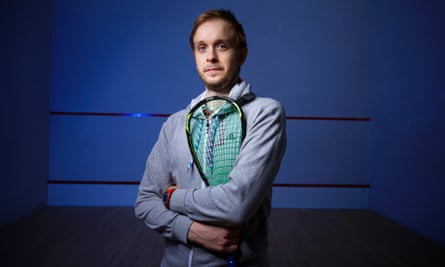
I reached the quarter-finals of the British Open in May, when my lower back back gave way and the right side of my body again was in bits. A couple of weeks lay ahead in which I thought I could sort out the problem. The Commonwealth Games were looming and the thought of anything threatening that was not funny.
Alison was not particularly impressed when she treated me immediately after that event: my body was tight, inflexible, crooked from all the play and travel. She dealt me two thorough and painful treatments, and sent me off on holiday with exercises, stretching routines, hockey balls and foam rollers for massage. A holiday of rehab. I had an MRI scan immediately on return and the phone call from the doctor in Manchester followed soon after.
I took the call over lunch in early June and, in one of those time-bending moments, the doctor delivered the news that my career could well be over. The layer of cartilage in the hip had worn thin and was arthritic. “Arthritic? I’m 31!”
I know we weren’t in the realms of real life problems exactly, but the message could not have been any more pessimistic in terms of any squash future I might have. Looking back now I realise it didn’t need to be so emphatically negative, but in a strange way I’m glad it was. Having faced this scenario and digested it, anything I ever gleam from the situation, to this day, will seem like bonus material. Hence the new perspective.
The situation was this: you’ve been doing this unforgiving sport for 25 years, competing, pushing every day to improve yourself (often in some pain) in this surreal world of difficult training, magnificent sporting occasions, highs and lows before big matches, wins and disappointments. In many respects it’s a fantastical world. Your living and livelihood essentially depend upon how well you hit little black balls around glass boxes and how fit and agile you are for that specific task. It’s hardly changing the course of history in any wide sense, but it was me, my life and the routines and lifestyle I had built around it.
Athletes are all too aware it will come to an end at some point, but so suddenly? I hadn’t factored such an early exit into the equation. “We can see a specialist,” the doctor said, giving me a vague hint of positivity. “OK.”
Thanks to my sister-in-law and England player, Sarah Kippax, who, as it happened, had an appointment with Irish hip specialist Max Fehily reserved the following week in Manchester, I was given attention quickly.
In the meantime I talked endlessly to Vanessa, my girlfriend and former women’s world champion, about would happen next. It’s always helpful to have her take on matters. Should I check in at the Job Centre?
I lamented about the Commonwealth Games, which presumably I would now miss, along with everything else in the calendar that I had intended to play. I spoke to my dad and coach, Malcolm, and my manager, Mick. They were both typically positive. Mick was moving scaffolding at the time for the renovations at our club in Pontefract, which brought my situation nicely back down to earth. I had an excuse not to help, not that I ever did.
My brother and coach, David, who was on a squad with the national team at the time, phoned me and we stuttered through a conversation of sorts. It struck me then that the feelings and shock weren’t entirely out of sadness for myself, but for others, such as David and Malcolm. It wasn’t just no more squash, it was no more training sessions with them. All that routine would be gone. After all the endless hours we had invested in each other, with David and Malcolm giving themselves so selflessly for me, this was one of the hardest things to accept at this point.
Jessica Ennis-Hill had a disaster with injury back in 2008 before the Beijing Olympics. Alison is also Jess’s physio, a key figure in her support team, and I remember feeling back then that Jess’s injury wasn’t just a disappointment for the heptathlete but that it affected many people’s lives and efforts.
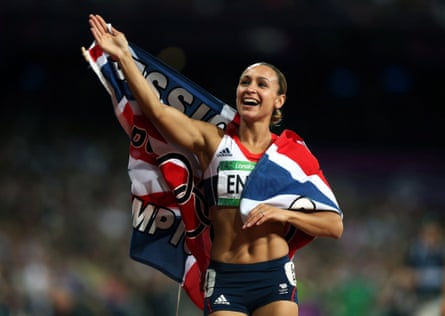
The thoughts that caused the most alarm concerned simple matters of lifestyle more than anything else. The daily routines, with others, were what sprung to mind: national training in the summer months, morning drives to Pontefract, my club since childhood, meetings with Mick over lunch. Simple daily routines as these would not continue to be necessary now.
I pulled out of a training camp at Manchester that week and some of the other players sent me texts, which was appreciated. The message seemed to be clearer than ever though.
A week later I saw Max Fehily at Manchester Hip Clinic. He affirmatively turned the situation on its head, never once mentioning anything about careers being curtailed, retirement or anything of the sort. He had seen the scans and was happy that we could operate and get me back playing. He said the hip was far from perfect, but suspected few squash players have perfect hips.
“Really? And the Commonwealth Games?” I asked. “Yes,” he said. “We can inject you and kill the pain. Six weeks further careful training shouldn’t damage it too much.”
I was a little worried that putting myself through more years of squash would do more permanent damage. Max replied: “You might need a hip replacement at some point, but then many people do and they come back strong and play sport for many years.”
I had the injection, Ali saw me consistently and kept the body working as well as it could in the six weeks before the Games. I was stretching, exercising, doing mobility exercises until the cows came home, and there were no silly, brutal impact court sessions. I managed some practice matches in Poland, France and Dubai, which took me in to Glasgow in decent enough shape.
To have arrived there was special in itself. To go and win two medals left me exhausted and thrilled, but enjoying the whole thing with new perspective made it better. Winning and losing did and didn’t matter. To win those medals for the people who had supported me through this was wonderful, but the way I was suddenly enjoying every second was even more of a revelation. This threat had given me a new lease of mental life, and a way of absorbing the fun of playing.
I had Vanessa, my dad, my brother, Mick and Alison there with me in Glasgow. People asked if I was disappointed to lose to Nick Matthew in the gold medal match and the answer was no. I was so thrilled to have been a part of Glasgow and that final was so special in view of the whole process. The crowds, the atmosphere around the place made the event a delight, and it was pure pleasure to walk to that venue every day and compete in that situation.
Every match in front of those audiences was a dream. I remember walking into the arena to a crowd of 1,500 with my doubles partner, Daryl Selby, in the early rounds of the pools and thinking, “Lap this up. Enjoy this. Nine days of matches on this court in this atmosphere. It doesn’t get better.”
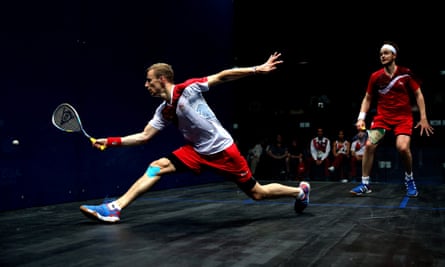
I played two more events in the Far East before going under the knife on 15 September last year, after which the recovery began.
There have been times in my sporting career that I have been unable to enjoy the reality of actually being a squash player, travelling the world, because of the intensity of trying to be so bloody good. In Glasgow that intensity had been lifted.
I don’t doubt that those medals came from a lot of hard work by many people, but I would not have been in Glasgow without Alison, and her tireless work helped to give me an experience I shall not forget.
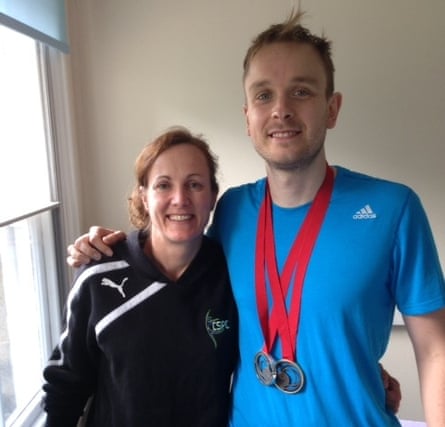
As a sportsman, especially a young one, you don’t think about the fact that the body can’t keep facilitating your need to constantly bruise and batter it every day. No wonder the body screams after hard matches and tournaments: it doesn’t like what you are asking it to do. And as professionals through training and matchplay, we are taking advantage of it hundreds of times a year.
You don’t quite realise or consider that there is a time limit. Sport is wonderful. It gives us so much of a rush and a thrill. It entertains and excites us. But the abilities you have to do it, to enjoy the thrills, will eventually expire, or as in Jess’s case let you down at some point, because of the nature of professional sport.
When athletes struggle with injuries it can be awful to watch. No, it is not life threatening, and yes it could always be worse, but injuries can cancel out years of effort, years of training underpinned by so much intention from many people. An injury can strike just before an Olympic Games and everything that has been invested in an athlete – the coaching, the funding, the support – might be defunct and almost wasted. It’s by no means just about one athlete missing one particular event and that being that.
We often have to suffer for over-doing the thing we love. We eat too much and we get fat, we drink too much and we get ill; we play too much squash and... we get knackered hips. Sport is the element of pleasure in all this and the injuries are the element of pain, which like many elements in life, go hand in hand.
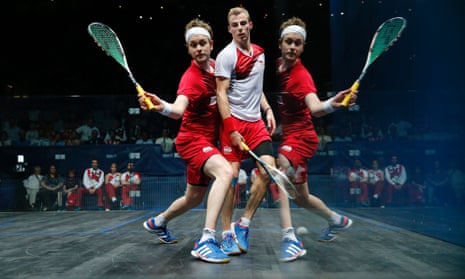
Comments (…)
Sign in or create your Guardian account to join the discussion